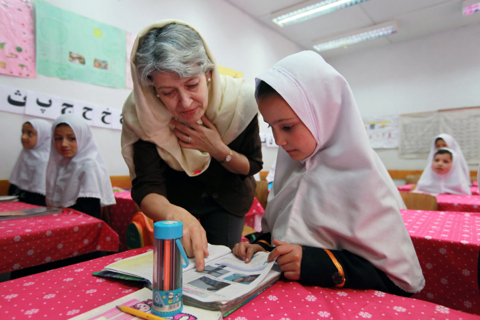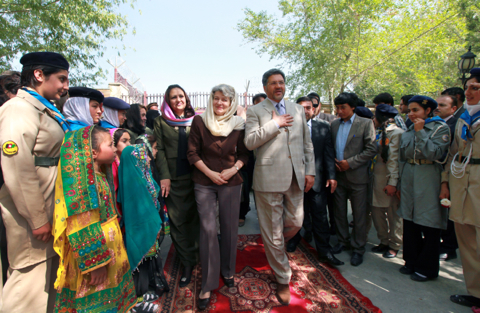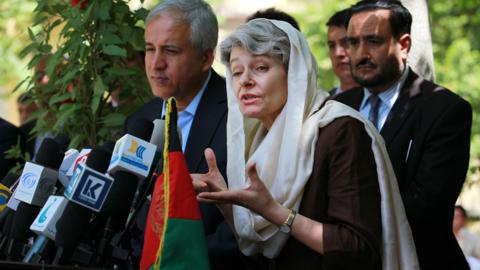KABUL - The Director-General of the United Nations Education, Scientific and Cultural Organization (UNESCO), Irina Bokova, used her visit to Afghanistan to raise awareness about the education of girls and to highlight the importance of the country’s cultural heritage as a vital economic asset.
The three-day visit by Mrs. Bokova included meetings with the President of Afghanistan, Hamid Karzai, and other senior government officials. Mrs. Bokova also met with students and workers in Afghanistan’s cultural sector.
Mrs. Bokova praised the Afghan President for promoting girls' education and enhancing literacy and assured him of UNESCO’s continued support on such issues.
“Providing education to girls and women is not against religious beliefs,” said Mrs. Bokova. “It enhances their opportunities to contribute to the development of their societies, to feel an integral part of them, and to benefit their families.”
The Director-General made a similar point in a visit with the Minister of Education, Farooq Wardak, to an elementary school for girls in Kabul. That school is named after Ayesha-e-Durrani, the first Afghan woman to open a school for girls in Afghanistan. Shuttered and damaged just a decade ago, today the school has an enrollment of 1,600 students and, with its computers and science laboratories, is a showcase for the progress made in educational opportunities for girls.
“Here in this school I see the results of our work,” said Mrs. Bokova. “I have come here with a strong message of support. You are a country of ancient traditions and young talent.”
Despite a decade of progress in the education sector, much work needs to be done, according to UNESCO. Three million Afghan children remain out of school, and 70 per cent of these are girls.
Simultaneous to the visit by the Director-General, the Elimination of Violence Against Women (EVAW) law came under harsh criticism from some members of Afghanistan’s Lower House of Parliament. These conservative lawmakers reportedly complained that some articles meant to offer new protections for Afghan girls and women run counter to Afghan traditions.
The landmark EVAW law, enacted in August 2009, criminalises child marriage, forced marriage, selling and buying women for the purpose or under the pretext of marriage, ba’ad (giving away a woman or girl to settle a dispute), forced self-immolation and 17 other acts of violence against women, including rape and beating. It also specifies punishment for perpetrators. The law was enacted by presidential decree and has yet to gain parliamentary approval. Judicial and law enforcement authorities are implementing the law but challenges persist in enforcing it.
The Director-General used her visit to make UNESCO’s position on that issue clear. She recognized the difficulty of changing mindsets and traditional views but emphasized that Afghan women need to be given assurances that they are full members of society.
A planned visit by the Director-General to the province of Bamyan was cancelled owing to severe weather that made air travel difficult. Instead, a visit was made to the National Museum, home to some of Afghanistan’s greatest archeological treasures. UNESCO has been working with the National Museum to create programmes that showcase Afghanistan’s vast and unique cultural legacy. Recently some important historical sites have come under threat from mining interests and the Director General urged authorities to step up their efforts to preserve the country’s heritage.
“Countries across the world strive to reconcile modernity and preservation of their cultural heritage assets,” she said. “The cultural heritage of Afghanistan will be the future economic and social asset of your country, it will provide self confidence and pride to the people of Afghanistan.”






